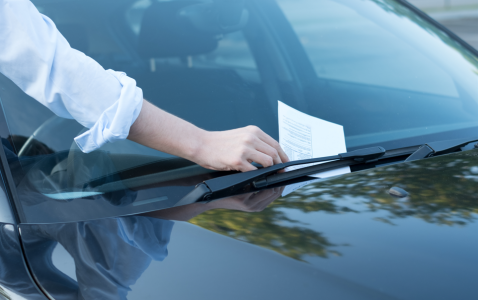Outrageous Fine Overturned: Learn How This Driver Turned a $387 Penalty Into a $4000 Victory – You Could Too!
By
- Replies 11
In a world where technology is increasingly intertwined with our daily lives, the rise of automated systems designed to enforce the law can sometimes lead to unexpected and unjust consequences. This was the stark reality faced by Sydney lawyer Merridy Gordon, who found herself on the receiving end of a hefty $387 fine and a loss of 10 demerit points for allegedly using her phone while driving. However, the supposed 'phone' in question was nothing more than a piece of banana bread, leading to a legal battle that turned the tables on the transport authorities.
Gordon's ordeal began on a routine drive home from Canberra along the M5 when mobile detection cameras mistakenly identified her as using a phone behind the wheel. The shock of receiving a notice in the mail about the fine and demerit points was only compounded by the fact that it was during a public holiday period, exacerbating the penalty.
Determined to clear her name, Gordon accessed the Transport for NSW (TfNSW) website to scrutinize the evidence against her. Upon enlarging the photos captured by the cameras, it became evident that the item in her lap was a square-shaped snack, not the rectangular form of a modern smartphone. Gordon's phone, encased in green, was actually tucked away beside her seat, far from her hands.
In an attempt to resolve the matter, Gordon contacted TfNSW, explaining the mix-up and providing clear evidence that the item was indeed banana bread. However, the response she received was dismissive, leaving her no choice but to take the issue to court.
The courtroom scene was almost cinematic. As soon as the magistrate reviewed the photos, he recognized the discrepancy, noting the obvious difference in shape between the alleged device and a mobile phone. Despite the TfNSW representative's skepticism over the thickness of the banana bread, the magistrate sided with Gordon, stating that the department had failed to prove beyond reasonable doubt that she was using a phone.
The outcome was a resounding victory for Gordon. Not only was her fine dismissed and her demerit points reinstated, but the court also ordered TfNSW to reimburse her $4,000 in legal fees. This case highlighted the potential for automated systems to err and the importance of human oversight and common sense in law enforcement.
Transport for NSW, while not commenting on the specific case, defended the mobile phone detection camera program as a crucial tool for achieving the government's ambitious target of zero road fatalities by 2056. They emphasized the rarity of misidentification and the presence of multiple review processes to ensure accuracy.
Gordon's experience serves as a powerful reminder to all drivers that if you believe you've been wrongfully fined, it's worth fighting back. It's essential to review any evidence against you carefully and, if necessary, challenge the fine through the appropriate channels. Her story is not just one of personal vindication but a beacon of hope for those who feel overwhelmed by the might of institutional authority.
For our readers at the Seniors Discount Club, this tale is particularly pertinent. As we navigate the roads and the complexities of modern technology, it's crucial to stay informed and assertive. If you find yourself in a similar situation, remember Merridy Gordon's story and know that you have the right to contest any penalties you believe are unjust.
 We'd love to hear your thoughts and experiences on this topic. Have you or someone you know ever been wrongfully fined due to a technological error? Share your stories in the comments below, and let's discuss the ways we can support each other in ensuring fairness and justice on the road.
We'd love to hear your thoughts and experiences on this topic. Have you or someone you know ever been wrongfully fined due to a technological error? Share your stories in the comments below, and let's discuss the ways we can support each other in ensuring fairness and justice on the road.
Gordon's ordeal began on a routine drive home from Canberra along the M5 when mobile detection cameras mistakenly identified her as using a phone behind the wheel. The shock of receiving a notice in the mail about the fine and demerit points was only compounded by the fact that it was during a public holiday period, exacerbating the penalty.
Determined to clear her name, Gordon accessed the Transport for NSW (TfNSW) website to scrutinize the evidence against her. Upon enlarging the photos captured by the cameras, it became evident that the item in her lap was a square-shaped snack, not the rectangular form of a modern smartphone. Gordon's phone, encased in green, was actually tucked away beside her seat, far from her hands.
In an attempt to resolve the matter, Gordon contacted TfNSW, explaining the mix-up and providing clear evidence that the item was indeed banana bread. However, the response she received was dismissive, leaving her no choice but to take the issue to court.
The courtroom scene was almost cinematic. As soon as the magistrate reviewed the photos, he recognized the discrepancy, noting the obvious difference in shape between the alleged device and a mobile phone. Despite the TfNSW representative's skepticism over the thickness of the banana bread, the magistrate sided with Gordon, stating that the department had failed to prove beyond reasonable doubt that she was using a phone.
The outcome was a resounding victory for Gordon. Not only was her fine dismissed and her demerit points reinstated, but the court also ordered TfNSW to reimburse her $4,000 in legal fees. This case highlighted the potential for automated systems to err and the importance of human oversight and common sense in law enforcement.
Transport for NSW, while not commenting on the specific case, defended the mobile phone detection camera program as a crucial tool for achieving the government's ambitious target of zero road fatalities by 2056. They emphasized the rarity of misidentification and the presence of multiple review processes to ensure accuracy.
Gordon's experience serves as a powerful reminder to all drivers that if you believe you've been wrongfully fined, it's worth fighting back. It's essential to review any evidence against you carefully and, if necessary, challenge the fine through the appropriate channels. Her story is not just one of personal vindication but a beacon of hope for those who feel overwhelmed by the might of institutional authority.
For our readers at the Seniors Discount Club, this tale is particularly pertinent. As we navigate the roads and the complexities of modern technology, it's crucial to stay informed and assertive. If you find yourself in a similar situation, remember Merridy Gordon's story and know that you have the right to contest any penalties you believe are unjust.
Key Takeaways
- A Sydney lawyer was fined $387 and lost 10 demerit points for allegedly using a phone while driving, which was actually a piece of banana bread.
- After challenging the fine in court with evidence, the magistrate ruled in her favour, noting that the item was clearly not a phone.
- Transport for NSW (TfNSW) was ordered to pay the lawyer $4,000 in legal fees, and her fine was dismissed with demerit points reinstated.
- Transport for NSW defended the mobile phone detection camera program as critical for road safety, despite the rare misidentification in this case.









